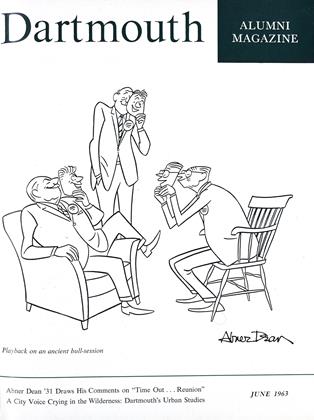By Edward Lamb '24. New York: Harcourt,Brace & World, 1963. 248 pp. $5.75.
There is a strong thread of kinship in this book for those who arrived at adulthood in the roaring twenties, who were young enough and sensitive enough to be caught up by both the suffering and the glorious vision of the thirties, yet old enough and still sensitive enough to be horrified by the McCarthy period. But let not others turn away, because here too is an absorbing tale for those who missed the sense of destiny-shared in those magnificently dreadful days - or having felt it, now choose to forget. For the extraordinary man who has written this book was not only an astute observer of, and participant in, our unavowed revolution of the thirties and forties, but he also became a jet-propelled Horatio Alger who, again as a participant, learned to manipulate to great personal wealth the intrigues and jungle infighting of mid-twentieth century corporate finance.
This is the autobiography of a "controversial figure." Ted Lamb wears that label proudly, because his whole life has been devoted to challenging the orthodox, whether as a civil liberties champion, or as the labor lawyer who won the famous "portal to portal" case before the United States Supreme Court, or as the slayer of the dragon in the outrageous FCC attack upon him, or as the organizer and present head of the fabulous Lamb Industries Inc.
Those of us who have followed at least the portions of Ted Lamb's career which erupted into the press will find in his book the subterranean background and deep-running causes of these volcanic explosions. They not only become more comprehensible but, let it be hoped, less reprehensible to those who have professed to be shocked. It is a thrilling tale told by a born fighter, a bold taker of risks who time after time finds himself entangled in Homerically hostile forces from which without exception he emerges triumphant. If there is a little of the "Look ma, no hands!" in the telling, one ungrudgingly recognizes as well deserved that relish in his own achievements which occasionally shows between the lines. Ted Lamb has already made both history and legend in a lifetime happily only now reaching full tide. As a Dartmouth classmate and as a friend, the reviewer rejoices that this is so, and himself takes vicarious pride in a doer as well as a dreamer who will not be suppressed.
 View Full Issue
View Full Issue
More From This Issue
-
 Feature
FeatureAs the Century Turned
June 1963 By Edward Connery Lathem '51 -
 Feature
FeatureA CITY VOICE CRYING IN THE WILDERNESS
June 1963 By H. WENTWORTH ELDREDGE '31 -
 Feature
FeatureNine of Dartmouth's Distinguished Professors Retire on June 30
June 1963 -
 Feature
FeatureTIME OUT ... REUNION
June 1963 By Abnez Dean -
 Class Notes
Class Notes1931
June 1963 By WILLARD C. WOLFF, WILLIAM T. WENDELL -
 Books
BooksLew Stilwell: A Fine Teacher
June 1963 By JAMES L. MONTAGUE '28
RICHARD MORIN '24
Books
-
 Books
BooksShelf Life
Sep - Oct -
 Books
BooksWar Administration of the Railways in the United States and Great Britain
July 1918 By C.A.P. -
 Books
BooksON COPIA OF WORDS AND IDEAS.
JUNE 1964 By JOHN W. ZARKER -
 Books
BooksIF I RAN THE ZOO,
January 1951 By MAUDE D. FRENCH -
 Books
BooksHow Much Freedom?
JUNE/JULY 1984 By Peter Smith -
 Books
BooksTHEMES IN GREEK AND LATIN EPITAPHS
November 1942 By Wm. Stuart Messer


